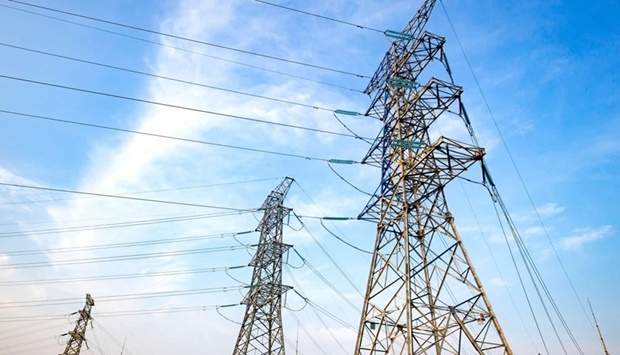Qatar Fund for Development (QFFD) has signed an agreement with the Gulf Cooperation Council Interconnection Authority (GCCIA) to develop the Gulf electricity interconnection system and connect it to the southern Iraq network.
This agreement aims to contribute to cover part of the demand for electricity as well as improving the performance and stability of the electricity network in the southern region of the Iraq by constructing a new 400 KV transformer substation in the Wafra area in Kuwait and connecting it to the Gulf electricity interconnection system and to the Iraqi electricity network thorough Al-Faw transformer station in southern Iraq.
HE Director General of Qatar Fund for Development Khalifa bin Jassim al -Kuwari said: "Together, in partnership with he Gulf Cooperation Council Interconnection Authority, we seek to extend electricity to our brothers in southern Iraq. As electricity support will play a fundamental and pivotal role in strengthening the vital basic sectors and supporting them such as the health sector, which will in turn provide health services to a large number of patients, in addition to strengthening the educational sector. This initiative will have a pivotal role in economic and infrastructure development."
CEO of the Gulf Electricity Interconnection Authority, Eng. Ahmed bin Ali al- Ibrahim, said the electrical connection has achieved economic savings for the GCC countries of nearly $3bn since the full operation of the project, while avoiding major interruptions in the Gulf networks since the start of operation in 2009, which has a significant impact on the continuity of electricity and its great impact on society and the economic and industrial sector in the GCC countries.
The project is being implemented by the GCC Electricity Interconnection Authority, which owns and manages the Gulf electrical interconnection network, and it is one of the most important infrastructure link projects approved by the Gulf Cooperation Council. Among the benefits achieved by the project are reducing the required reserve in each country, mutual coverage in case of emergency, benefiting from the surplus, and reducing the cost of producing electric power among the GCC countries.
In 2001, the GCCIA was established, and the interconnection project was completed in 2009.
The authority considers that the signing of the interconnection agreement with the electricity network in southern Iraq, which coincided with the Jeddah Summit for Security and Development on July 15, 2022, is one of the most important strategic projects in the GCC countries, which will start implementation work during this month, hoping to complete it in the summer of 2024.
It is worth noting that the Gulf Electricity Interconnection Project achieved its most important strategic objectives of enhancing energy security and raising the level of reliability and safety for the Gulf electrical systems, and its success in avoiding the GCC electricity networks from partial or total interruption by 100% by providing instant support by transferring the required energy through the network.
This agreement aims to contribute to cover part of the demand for electricity as well as improving the performance and stability of the electricity network in the southern region of the Iraq by constructing a new 400 KV transformer substation in the Wafra area in Kuwait and connecting it to the Gulf electricity interconnection system and to the Iraqi electricity network thorough Al-Faw transformer station in southern Iraq.
HE Director General of Qatar Fund for Development Khalifa bin Jassim al -Kuwari said: "Together, in partnership with he Gulf Cooperation Council Interconnection Authority, we seek to extend electricity to our brothers in southern Iraq. As electricity support will play a fundamental and pivotal role in strengthening the vital basic sectors and supporting them such as the health sector, which will in turn provide health services to a large number of patients, in addition to strengthening the educational sector. This initiative will have a pivotal role in economic and infrastructure development."
CEO of the Gulf Electricity Interconnection Authority, Eng. Ahmed bin Ali al- Ibrahim, said the electrical connection has achieved economic savings for the GCC countries of nearly $3bn since the full operation of the project, while avoiding major interruptions in the Gulf networks since the start of operation in 2009, which has a significant impact on the continuity of electricity and its great impact on society and the economic and industrial sector in the GCC countries.
The project is being implemented by the GCC Electricity Interconnection Authority, which owns and manages the Gulf electrical interconnection network, and it is one of the most important infrastructure link projects approved by the Gulf Cooperation Council. Among the benefits achieved by the project are reducing the required reserve in each country, mutual coverage in case of emergency, benefiting from the surplus, and reducing the cost of producing electric power among the GCC countries.
In 2001, the GCCIA was established, and the interconnection project was completed in 2009.
The authority considers that the signing of the interconnection agreement with the electricity network in southern Iraq, which coincided with the Jeddah Summit for Security and Development on July 15, 2022, is one of the most important strategic projects in the GCC countries, which will start implementation work during this month, hoping to complete it in the summer of 2024.
It is worth noting that the Gulf Electricity Interconnection Project achieved its most important strategic objectives of enhancing energy security and raising the level of reliability and safety for the Gulf electrical systems, and its success in avoiding the GCC electricity networks from partial or total interruption by 100% by providing instant support by transferring the required energy through the network.

